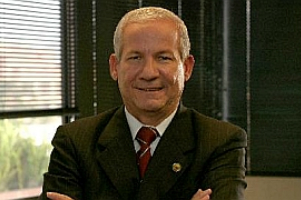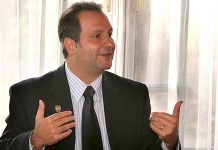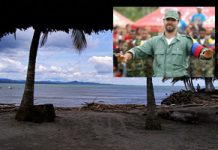Former governor Libardo Simancas was sentenced to three years and six months in prison and fined 2 billion pesos for allying with ´paras´ of the Heroes Bloc of the Montes de Maria.
 |
|
| The former representative and governor of Bolívar was involved with paramilitaries of the Heroes Bloc of the Montes de María and with the businesswoman Enílse López, known as ´La Gata.´ Photo: Semana Archive |
The Penal Division of the Supreme Court sentenced the former governor of Bolívar Libardo Simancas Torres to three years and six months in prison for receiving political and electoral benefits from the paramilitaries of the Heroes Bloc of the Montes de María.
After turning himself in and accepting a plea bargain in March for conspiracy charges, Simancas admitted to relying on the paramilitary group to become governor in 2003.
The Court made its decision on the basis of testimony from Salvatore Mancusco, boss of the Catatumbo Bloc and four of the main bosses of the Montes de María Front: Uber Bánquez Martínez, alias ´Juancho Dique´; Edward Cobos Téllez, alias ´Diego Vecino´; Eugenio Reyes Rengifo, alias ´Geño´; and Alexis Mancilla García, alias ´Zambrano.´
The demobilized paramilitaries explained that Simancas met with them on various occasions and pushed for the resignation of the other contender, Alfonso López Cossio. Ahead in the polls, López Cossio relied on the help of paramilitaries Rodrigo Tovar Pupo, alias ´Jorge 40,´ and Iván Roberto Duque, alias ´Ernesto Baéz.´
These meetings were known as the pact of ´Barranco de Loba´ and the meeting as ´El Caramelo.´
In a 2011 hearing during Justice and Peace processes, ´Juancho Dique´ said that Simancas begged him to carry out political propaganda in his territories.
“Doctor Libardo Simancas said to me, ´my campaign, the governorship is in your hands; tell me what you want,´” Dique said. “But at that moment, the elections were favoring López Cossio and not Simancas.”
Simancas managed to get paramilitary support after enlisting various politicians and Enilse López, alias ´La Gata,´ a controversial businesswoman who then had a political monopoly on the region. López was convicted of maintaining links with paramilitaries.
From the pact of ´Barranco de Loba´ to the meeting of ´El Caramelo´
According to the Supreme Court´s ruling, a key piece of evidence was the testimony of a community leader in Tiquisio, Bolívar, who described the first meeting of the region’s politicians and paramilitary bosses before the 2003 elections.
He said that the meeting, which took place in the southern town of Barranco de Loba, was organized by ´Ernesto Báez´ and consisted of roughly 1,300 people, the majority hoping to be elected as city councilors, mayors and to other popular offices. The goal of the ´congress´ was to determine which of these aspiring politicians would receive paramilitary endorsement.
“At the end of the meeting, which occurred on a farm on the outskirts of a site known as ´Pueblito Mejía,´ and which the leaders Vincente Blel Saad, William Montes, Alfonso Hilsaca [a recognized contractor in Cartagena and Bolívar] and Miguel Rangel Sosa [all of whom have been investigated for involvement in parapolitics] attended, Libardo Simancas Torres, Alfonso López Cossio, Senén González and Luís Gutiérrez Gómez were chosen as candidates,” the Tiquisio leader said.
According to the Court´s decision and the leader´s testimony, after hearing proposals from these candidates, the paramilitary bosses ´Jorge 40´ and ´Ernesto Baéz´ were inclined to support López Cossio, who apparently offered exchange money and government contracts.
Although Simancas attempted to convince each of the bosses of the Heroes Bloc of the Montes de María to support him, he failed to achieve his goal when various politicians who sympathized with him met with Salvatore Mancuso to intervene on his behalf before ´Ernesto Báez.´ The meeting took place in the village ´El Caramelo´ in Tierralta, Córdoba.
“Looking back, I remember that in the middle of 2003 there was a hesitance from Bolívar politicians because they weren’t letting them make policies … Around that time, Eleonora [Pineda] called me and told me that [Vincente] Blel, [Javier] Cáceres and William Montes had contacted her for two reasons. The first was that they weren’t being allowed to campaign for the gubernatorial candidate they supported [Simancas], and the second was that they [the paramilitaries] supported López Cossio,” Mancuso said during the trial of Javier Cáceres, sentenced to 9 years in prison for involvement with parapolitics.
Pressure from ´La Gata´
Also present at the meeting in ´El Caramelo´ was the businesswoman Enilse López, ´La Gata,´ who, according to the prosecution, was the one who pressured Mancuso to support Simancas and not López Cossio.
Just one month before the elections, her pressure became effective.
Although some politicians and paramilitaries wanted to avoid an administration controlled by the businesswoman, Simancas won the election and ´La Gata´ took control of more than 50 percent of departments, particularly those of finance, education and health.
Although both Cossio and Simancas had agreed to give control of the health department in exchange for the backing of the paramilitary group, support from the region’s politicians tipped the balance in favor of the latter.
In the end, Simancas was elected with 261,000 votes, or 57% of the state’s popular vote.
This testimony was supported by Reyes Rengifo, the boss of the Heroes Bloc of the Montes de María in Cartagena.
According to a letter he sent from the Ternera jail in Cartagena to the office of the Attorney General in 2007, he participated in the meetings between Simancas and paramilitary bosses of Bolívar and Córdoba and witnessed the influence that ´La Gata´ had in the decision.
Furthermore, he said that as a paramilitary boss in Cartagena, he was charged with providing money to mayoral and city council hopefuls in the cities of northern Bolívar so that they would support Simancas.
In its decision, the Supreme Court rejected the possibility of home detention and ordered the politician to pay a fine of 2 billion pesos.











